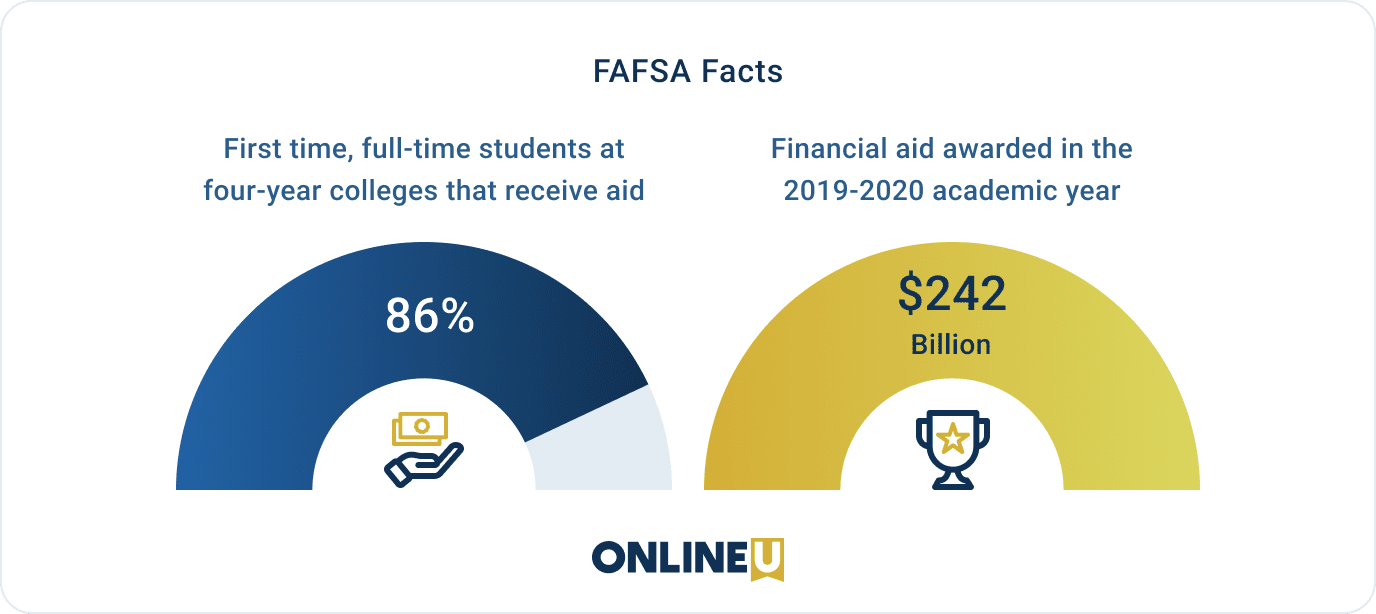College Guide for LGBT Students
Over the past 20 years, many colleges and universities have taken active steps to become more inclusive for LGBTQ students. The 2020 Campus Climate Survey conducted by the Association of American Universities shows that college environments, resources, and policies have and continue to improve overall for gay, transgender, gender nonconforming, and queer students.
However, many LGBTQ students still face significant obstacles in college. Some schools do not offer the type of support, resources, or training needed to create a safe and welcoming campus climate.
This resource serves as an LGBTQ student's guide to college and will help address some of the most common barriers in school. With the help of Dr. Brandon Haddock (they/them), LGBT Resource Center Coordinator at Kansas State University, we'll offer advice on choosing an LGBTQ-friendly college, identifying resources and avenues of support, and finding financial aid and scholarships for LGBTQ students.

ON THIS PAGE
Finding a College Common Barriers LGBTQ Scholarships ResourcesHow to Find an LGBTQ-Friendly College
The college search can seem overwhelming for any student, regardless of their gender identity or sexual orientation. Factors like what majors are offered, how much it costs, and location all play a major role in college choice.
For LGBTQ students, however, one of the most important considerations is whether you'll feel welcome on campus. College is a time for self-exploration, and it's critical to have a safe and nurturing space to do that in.
Throughout the college search, students should feel free to ask as many questions as they need. College representatives are trained to explain every aspect of the campus, so students don't have to shy away from asking for more information, even if the questions seem awkward or difficult.
As they consider different possibilities, students may want to look for schools that are making a visible effort to support their gay, lesbian, bisexual, trans, nonbinary, and queer students. Here are some of the most important things to look for in an LGBTQ-friendly college.
Campus Policies for LGBTQ Students and Staff
Finding a college that is committed to protecting the LGBTQ campus community is a top priority.

Brandon Haddock
LGBT Resource Center Coordinator at Kansas State University
When I was looking at graduate programs, I immediately went to each school's non-discrimination policy and looked for sexuality and gender identity as a protected identity within their non-discrimination clause.
Students can also find out what type of training faculty and staff receive, what the reporting process is, and how these issues are handled if they arise. Even something as seemingly simple as changing the name on a student ID can be difficult at some schools, but this can be determined in advance through research. Students can also ask what kind of education and sensitivity training is included in student orientation, and if it addresses harassment policies on campus.
LGBTQ+ Student Life
Finding a school with a welcoming and supportive campus community is an important part of the college experience. Haddock advises students to research whether a college and its surrounding community are LGBTQ-friendly.
"Are there things happening that might raise a red flag?" Haddock said. If not, check to see if the school offers an LGBTQ resource center or community center, and if there are student-led pride organizations, events, and programs. A school that supports a vibrant, active LGBTQ student community will make that visible on their website, Haddock said. Joining queer clubs and organizations is also a great way to meet other LGBTQ students on campus.
Students can also use the Campus Pride Index to gauge how LGTBQ-friendly a school is. This tool rates schools from one to five stars based on the level of campus inclusion to identify the best schools for LGBTQ students. Campus Pride also maintains a list of the worst colleges for LGBTQ students based on which schools have applied for Title IX exemptions to discriminate against LGBTQ students or have a history of discrimination.
Gay, trans, nonbinary, and queer student athletes should also check their sports index to find out how inclusive a college's sports policies are.
Gender-Inclusive Housing
For students who plan to live on campus, it's important to check the school's policies regarding housing, Haddock says, including gender-neutral bathrooms and showers. Above all, LGBTQ students need to feel comfortable, safe, and respected in their home away from home. Check Campus Pride's resource to find schools that offer inclusive and gender neutral housing.
For students who plan to live off campus, search engines like Roommates.com, Roomies.com, and Sublet.com offer LGBTQ-friendly roommate finder services. You can post on there looking for a roommate, or find a profile for a roommate that meets your criteria.
Health Care and Counseling for LGBTQ Students
College is a time of personal growth and self-discovery for many students, and for some this may require additional counseling and support. Students may have experienced discriminatory behavior from health care providers in the past, so they may want to check with a prospective school to ensure that counselors and practitioners will welcome them, respect their privacy, and treat them with dignity. Similarly, students should check with the health clinic to confirm the facility can address any specific health care needs. If not, they may be able to refer students to a clinic off campus.
Lesbian, Gay, Bisexual, and Transgender Studies
Finding schools that have queer studies as a major, a few classes, or part of the curriculum may be a priority for some LGBTQ students. Even if it isn't the top choice for a major, the option to take a few classes in related subject areas might be a benefit. What is or is not included in classes and majors can also be an indicator of campus climate and institutional support.
Online School for LGBTQ Students
Even students who plan to take all or most of their classes online should still consider these characteristics before choosing a school. If students aren't able to visit the school personally before making a selection, Haddock recommends looking at the school's website and printed materials carefully. "Representation matters," they said. "Online students need to see that their identities are being affirmed in the materials they're given."
Finding the Most LGBTQ-Friendly Colleges
The Campus Pride Index publishes a list of the best colleges for LGBTQ students each year, based on colleges' self assessments of how well they support gay, trans, gender nonconforming, queer, and other students under the LGBTQ umbrella. Criteria include policy inclusion, institutional commitment, academic life, student life, housing, safety, counseling and health, and recruitment and retention for LGBTQ students.
The Best Schools for LGBTQ Students
| Region | School | State |
|---|---|---|
| Mid-Atlantic | University of Maryland | MD |
| Mid-Atlantic | Montclair State University | NJ |
| Mid-Atlantic | Hofstra University | NY |
| Mid-Atlantic | Ithaca College | NY |
| Mid-Atlantic | Lehigh University | PA |
| Mid-Atlantic | The Pennsylvania State University | PA |
| Mid-Atlantic | University of Pennsylvania | PA |
| Midwest | Kansas State University | KS |
| Midwest | Southern Illinois University Carbondale | IL |
| Midwest | Indiana University, Bloomington | IN |
| Midwest | Kent State University | OH |
| Midwest | Kenyon College | OH |
| Midwest | University of Wisconsin Eau Claire | WI |
| Midwest | University of Wisconsin Green Bay | WI |
| Midwest | University of Wisconsin Milwaukee | WI |
| New England | University of Vermont | VT |
| New England | Tufts University | MA |
| New England | University of Massachusetts Amherst | MA |
| Southeast | Northern Kentucky University | KY |
| Southeast | University of Kentucky | KY |
| Southeast | Elon University | NC |
| Southeast | University of Virginia | VA |
| Southwest | Texas Tech University | TX |
| Southwest | University of Texas at Dallas | TX |
| West | San Diego State University | CA |
| West | University of Colorado at Boulder | CO |
| West | University of Northern Colorado | CO |
| West | Southern Oregon University | OR |
| West | University of Oregon | OR |
| West | Washington State University | WA |
Location can also play a big role in how welcoming a community will be. Going to college in an LGBTQ-friendly state like New York, Connecticut, Massachusetts, New Jersey, or Vermont may be a better option for gay, trans, nonbinary, and queer students.
Common Barriers for LGBTQ Students and How to Overcome Them
Both educators and organizations within the LGBTQ community have conducted studies to identify the most common obstacles faced by lesbian, gay, bisexual, transgender, gender nonconforming, and queer students. Haddock has observed some of these problems firsthand, and offers the following suggestions for overcoming them:
Feeling Ostracized
Depending on where they live and go to school, feelings of isolation, not belonging, or not being visible can be common for LGBTQ students, especially withought a strong queer community on campus. A 2021 study conducted by the Trevor Project showed that 75% of LGBTQ youth have experienced discrimination at least once in their lifetime. This situation can be even more pronounced if a student has chosen to attend a college with a particularly conservative administration, student body, or faculty.
Haddock urges LGBTQ students who feel as if they don't fit in to make the effort to find a community where they feel welcomed and respected. Haddock admits that resources, such as an LGBTQ office or center, may not be immediately visible so it may take some effort to locate these on campus. Students may need to ask peers or faculty members or search the school's website to find resources. They also note that some schools have established safe zones. "When individuals see those safe zone stickers around campus, they know that that individual is a safe, affirming person to talk to."

Brandon Haddock
LGBT Resource Center Coordinator at Kansas State University
Some individuals may be attending an institution — maybe because their parents chose that institution for them — in which they're not able to reconcile the multiple identities they hold until they're out of the environment. My advice would be to seek out resources that may be available outside of their institutions. There are several national organizations, and there may be local support systems.
If they can't find community on campus, students may also be able to connect with gay, trans, and queer groups online.
Feeling Unsafe
Despite many schools' efforts to create a safe environment for all students, many LGBTQ students still experience discrimination, harassment, and violence based on their sexual orientations or gender identities.
Data from the National Center for Education Statistics shows sexual orientation was the second largest motivator for on-campus hate crimes in 2018. According to a 2019 study from the Association of American Universities 22.8% of transgender, non-binary, and genderqueer and questioning students report experiencing nonconsensual sexual contact. These students are also at a higher risk for sexual harassment, intimate partner violence, and stalking than their cisgender peers.
Haddock advises any student who feels threatened or uncomfortable in any way to speak up by contacting a trusted faculty member, staff member, or the LGBTQ office on campus.
"My recommendation to students would be to learn to use their voice," they said. "I know how difficult that can be, so they must learn to do it in a safe manner so that they're not endangering their physical health, their mental health, or their academics."
If an incident occurs, Haddock encourages students to file a report with the LGBTQ office, the administrative office, or the campus police. "Even if the event does not meet the criteria for an actionable offense, they can help you," Haddock said.
Mental Health Issues for LGBTQ Students
Research shows that LGBTQ students are at a higher risk for anxiety, depression, suicidal thoughts, substance use disorder, and other mental health issues. This is likely due in part to previous or ongoing discriminatory treatment and harassment.
Some students also come out while in college, often because they have the freedom to explore their true identities for the first time. This experience can be filled with intense emotion and anxiety about how friends and family members will react. Trying to focus on academics during these periods of extreme stress or depression can be challenging.
Mental health issues should not and do not have to be endured alone, Haddock reminds students, and these services are readily available on or through most campus healthcare facilities. "Most universities have counseling services. I would say that it's very rare that you see an institution that does not have access to physical and mental healthcare."
Struggling with mental health? Use our Mental Health Guide to help find resources on campus.
Feeling Disconnected in the Online Environment
Many students opt to pursue their degrees online. Attending school virtually is ideal for some, but for others it can lead to feeling disconnected from peers and faculty. Haddock offers two pieces of advice for online students who want to feel more connected.
First, they advise spending more time interacting with peers and faculty online in a friendly, casual way, just as they would on campus. The other suggestion is to remember that on-campus services, such as an LGBTQ resource center, are available to online students, so they can reach out and request help, including local assistance.
"I've had phone calls from individuals who are taking online classes, and I've been able to connect them with resources in their own spaces," they explain. "There is a network of LGBT professionals across the country, and we talk to one another. I know that I can reach out to my colleagues and ask for help."
LGBTQ Scholarships
Many organizations, from the federal and state governments to colleges and private organizations, offer scholarship funding specifically for LGBTQ students. The more grant and scholarship money students can obtain, the less they'll have to pay out of pocket or borrow in student loans.
All students — whether they're earning their degrees traditionally or online at an accredited college or university — should start by filling out the Free Application for Federal Financial Aid (FAFSA). This application is used to determine each student's eligibility for federal financial aid, such as Pell grants, as well as grants and scholarships sponsored by state governments and the schools themselves. The FAFSA also acts as an application to many LGBTQ scholarships sponsored by universities such as Eastern Michigan University, University of Colorado Boulder, Washington State University, Wayne State University, Texas State University, and many others.
Filling out the FAFSA can be time-consuming and complicated, but it is well worth the effort. Recent data indicates that about 86% of first-time, full-time students at four-year colleges received aid, and a total of about $242 billion in financial aid was awarded to college students in the 2019-2020 academic year. LGBTQ students and their families can ask their high school or college financial aid office counselors for help in submitting the form, and the FAFSA website provides additional information.

Students can also apply for privately funded LGBTQ scholarships. Each of these financial aid opportunities requires a separate application, but the more time and energy students devote to a scholarship search, the more money they can receive that won't have to be paid back.
We've divided our list of college scholarships for LGBTQ students into two sections—one with broad eligibility criteria and the other with more specific criteria. Some programs require applicants to demonstrate financial need or academic achievement, and almost all require a proven track record of community service, often to the LGBTQ community. Note that the Point Foundation and the Pride Foundation programs encompass dozens of individual scholarships, many of which have their own eligibility requirements.
General Scholarships for LGBTQ+ Students
Point Foundation Scholarship Program
The Point Foundation operates one of the largest scholarship programs for LGBTQ students, and has granted more than $35 million in awards since 2002.
Award Information
- Number of annual awards and award amounts vary
- One application is used to apply for the Point Foundation's 23 individual scholarships for undergraduate, graduate, and doctoral students
Eligibility
Applicants Must
- Be out as a member of the LGBTQ community
- Be a full-time, on-campus student at an accredited university in the U.S.
- Demonstrate financial need and academic achievement
- Have a record of service and leadership within the LGBTQ community
Application Information
- Late January deadline
- Standardized test scores may be required
- Finalists will be asked to submit an additional video essay
Point Community College Scholarship Program
The Point Foundation has awarded more than $35 million to LGBTQ students since 2002. It runs two separate sets of scholarship programs, one of which is exclusively for community college students.
Award Information
- Number of annual awards and award amounts vary
- One application is used to apply for the Point Foundation's 16 individual scholarships for undergraduate, graduate, and doctoral students
Eligibility
Applicants Must
- Be "out" as a member of the LGBTQ community
- Be enrolled in an accredited community college in the U.S.
- Have one or two years left to complete either an associate degree program or to finish preparing to transfer to a four-year school
- Demonstrate financial need and academic achievement
- Have a record of service and leadership within the LGBTQ community
Application Information
- May deadline
- Required documents include transcripts and a resume
Traub-Dicker Rainbow Scholarship
Managed by the non-profit Stonewall Foundation, the Traub-Dicker Rainbow Scholarship was created to support lesbian women pursuing a college education.
Award Information
- $1,500-$3,000
- An average of five recipients annually
Eligibility
Applicants Must
- Identify as a lesbian woman
- Be enrolled as an undergraduate or graduate student at an accredited university in the U.S.
- Demonstrate academic achievement
- Show a history of service and leadership within the LGBTQ community
Application Information
- June deadline
Gamma Mu Foundation Scholarship Program
Dedicated to supporting the LGBTQ community primarily in rural or underserved areas, the Gamma Mu Foundation has awarded more than $2 million in college scholarships and grants for other non-profit organizations over the past 20+ years.
Award Information
- $1,000-$2,500
- Number of annual recipients varies
- One application is used to apply for multiple scholarships within the Gamma Mu program
Eligibility
Applicants Must
- Identify as a gay man under the age of 35
- Be a U.S. citizen
- Have been accepted as an on-campus undergraduate or graduate student at an accredited university in the U.S.
- Demonstrate financial need and academic achievement
- Show personal and career goals that align with Gamma Mu's mission
- Show a history of involvement within the LGBTQ community
Application Information
- March 31 deadline
- Required documents include a resume
League Foundation Scholarships
The League Foundation is dedicated to supporting LGBTQ high school students, and has awarded more than $315,000 in scholarships since 1996.
Award Information
- Average award is $2,000
- Four or five awards given out each year
Eligibility
Applicants Must
- Be an openly self-identified member of the LGBTQ+ community
- Be a graduating high school senior
- Be a U.S. citizen
- Have been accepted at an accredited college or university
Application Information
- April deadline
- Required documents include high school transcripts, two letters of recommendation, two personal essays, and a detailed list of community service activities
Specialty Scholarships for LGBTQ+ Students
Founded in 2016 by the New York Ramblers Soccer Club, this scholarship supports student athletes within the LGBTQIA2S+ community.
Award Information
- $2,500
- Two recipients per year
Eligibility
Applicants Must
- Identify as a member of the LGBTQIA2S+ community or an ally of the community
- Be a student athlete
- Have been accepted at or be enrolled in an undergraduate program at an accredited college
- Demonstrate financial need and academic excellence
- Demonstrate service to the LGBTQ+ community
Application Information
- June 1 deadline
- Required documents include transcripts, five brief essays, two letters of recommendation, and list of honors and extracurricular achievements
This set of scholarships is designed to encourage and support LGBTQ students who are interested in studying STEM subjects or STEM-related teaching.
Award Information
- $1,500-$8,000
- Number of award recipients varies
Eligibility
Applicants Must
- Identify as a member of the LGBTQ+ community
- Have completed at least two years of college at an accredited U.S. institution
- Be majoring in a STEM subject or STEM-related teaching
- Have a GPA of at least 2.75
- Demonstrate their service to the LGBTQ+ community
Application Information
- June deadline
- Required documents include transcripts, financial documents, letters of recommendation, and an essay
Inclusion in Digital Marketing Scholarship
Intuitive Digital Marketing has recently created this scholarship to encourage students from underrepresented groups to pursue a degree related to marketing.
Award Information
- $3,500
- One recipient per year
Eligibility
Applicants Must
- Identify as a member of an underrepresented student group, such as a minority or a member of the LGBTQ+ community
- Be entering their third or fourth year in a marketing, web design, digital marketing, or similar program at an accredited college
- Have a GPA of at least 2.75
- Demonstrate their service to the LGBTQ+ community
Application Information
- July 30 deadline
- Required documents include proof of enrollment, a letter of recommendation, a portfolio of work, and an essay
Pride Foundation Scholarship Program
Since 1993, the Pride Foundation has awarded more than $6 million in scholarships to LGBTQ college students across the Northwest.
Award Information
- Award amounts and number of annual awards vary
- One application can be used to apply for about 60 individual scholarships
Eligibility
Applicants Must
- Identify as an LGBTQ student or ally
- Be a resident of Alaska, Idaho, Montana, Oregon, or Washington
- Be enrolled in any undergraduate or graduate program at an accredited college or technical school
- Show leadership potential and service to the LGBTQ community
- Demonstrate significant financial need
- Some of the Pride Foundation scholarships may have additional criteria; for example, many scholarships are for individuals studying particular subjects
Application Information
- January deadline
- Required documents include an application with essay questions
LGBT Chamber of Commerce Foundation Scholarships
In the State of Texas, the LGBT Chamber of Commerce Foundation provides scholarships to be used toward any type of post-secondary education or training.
Award Information
- Award amounts and number of annual awards vary
Eligibility
Applicants Must
- Identify as an LGBTQ student, family member, or ally
- Be a resident of Texas and a student at a Texas-based college, technical school, or vocational school
Application Information
- May deadline
- Required documents include a Texas driver's licence, school transcripts, and two letters of recommendation
Hampton Roads Pride Scholarships
Hampton Roads Pride has been supporting Virginia-based LGBTQ+ students with scholarships since 2002.
Award Information
- $1,600
- Up to four recipients per year
Eligibility
Applicants Must
- Identify as an LGBTQ+ student or ally
- Be a resident of Virginia
- Have been accepted to or be enrolled in an accredited post-secondary educational institution in the U.S.
- Have a minimum 3.0 GPA
Application Information
- April deadline
- Required documents include transcripts
Audria M. Edwards Memorial Scholarship
Created in memory of Audria M. Edwards by her children, this scholarship for Oregon and Washington residents is funded by donations and other fundraisers.
Award Information
- Award amounts and number of annual awards vary
Eligibility
Applicants Must
- Identify as an LGBTQ+ student or family member
- Be a resident of Oregon or Clark, Cowlitz, Skamania, or Wahkiakum counties in Washington
- Be pursuing an undergraduate degree at an accredited college
- Demonstrate a commitment to serve the LGBTQ+ community
Application Information
- April deadline
- Required documents include transcripts, letters of recommendation, and an essay
The eQuality Scholarship Collaborative has provided more than $1.7 million in scholarships to LGBTQ+ students in Northern and Central California over the last 30 years.
Award Information
- $6,000
- Each year, awards go to 10-15 high school students, two community college students, and five undergraduates
Eligibility
Applicants Must
- Be a resident of Northern or Central California OR pursuing a medical degree at an accredited California college
- Be pursuing an undergraduate degree at an accredited college
- Show a history of serving the LGBTQ+ community
- Demonstrate financial need, academic achievement, and leadership abilities
Application Information
- January deadline
- Required documents include transcripts, proof of acceptance or enrollment, and proof of residence
- Finalists will be asked to participate in a live interview
Live Out Loud Young Trailblazers Scholarship
As part of its mission to inspire and empower LGBTQ youth, Live Out Loud provides scholarships for graduating high school seniors in the Tri-State area of New York, New Jersey, and Connecticut.
Award Information
- $5,000
- Number of recipients varies
Eligibility
Applicants Must
- Identify as an LGBTQ+ student who is graduating high school
- Be a resident of the Tri-State area of New York, Connecticut, and New Jersey
- Intend to enroll at an accredited college, technical or vocational school
Application Information
- March 15 deadline
- Required documents include an essay and two letters of recommendation
- Finalists will be asked to participate in a live interview
Sponsored by the Central Florida Foundation, the 49 Fund honors those who were killed during the 2016 attack on the Pulse Nightclub in Orlando, Florida.
Award Information
- $4,900
- Up to 10 scholarships awarded each year
Eligibility
Applicants Must
- Be "out" as a member of the LGBTQ community
- Be a Central Florida resident
- Be enrolled in an undergraduate or graduate program at an accredited college in the U.S.
- Be a full-time student with a minimum 2.5 GPA
- Demonstrate financial need
- Show a record of service and leadership within the LGBT community
Application Information
- February 15 deadline
- Required documents include transcripts, financial records, a copy of the college acceptance letter, a letter of recommendation, and an essay
Additional Resources
LGBTQ+ students and allies may find useful information and resources on the following websites:
GLSEN Network: The Gay, Lesbian and Straight Education Network is an advocacy group of more than 1.5 million K-12 educators who have united to support LGBTQ+ students through research, activism, and resources for college-bound students.
American Indian College Fund: The AICF takes a proactive approach to partnering with sponsors and assisting them in raising additional funds for scholarships.
Human Rights Campaign: With more than 3 million members and supporters, the Human Rights Campaign is a political advocacy group fighting for equal rights for all and particularly for members of the LGBTQ+ community.
Out & Equal: The Out & Equal team works with Fortune 1000 companies to enhance diversity and inclusion, especially for LGBTQ employees, in the workplace.
The Trevor Project: Most importantly, the Trevor Project provides a hotline and other counseling options for LGBTQ youth who are in crisis or contemplating suicide. The website also offers resources and information for LGBTQ students, families, and allies.
Related Articles
Diversity & Inclusion Guides
Going to college as an underrepresented student comes with its own unique challenges and opportunities.
By OnlineU Staff Writers | 8/30/2022

